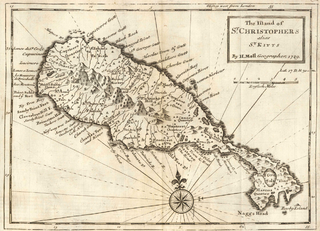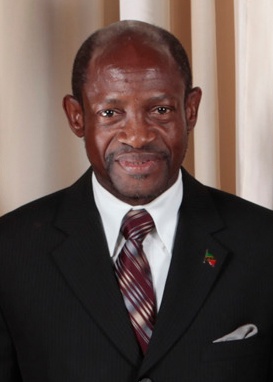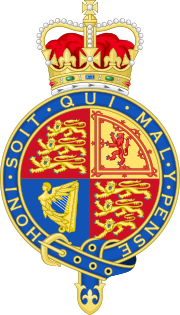
The Judicial Committee of the Privy Council (JCPC) is the highest court of appeal for the Crown Dependencies, the British Overseas Territories, some Commonwealth countries and a few institutions in the United Kingdom. Established on 14 August 1833 to hear appeals formerly heard by the King-in-Council, the Privy Council formerly acted as the court of last resort for the entire British Empire, other than for the United Kingdom itself.

Nevis is an island in the Caribbean Sea that forms part of the inner arc of the Leeward Islands chain of the West Indies. Nevis and the neighbouring island of Saint Kitts constitute the Federation of Saint Kitts and Nevis, a singular nation state. Nevis is located near the northern end of the Lesser Antilles archipelago about 350 kilometres (220 mi) east-southeast of Puerto Rico and 80 kilometres (50 mi) west of Antigua. Its area is 93 square kilometres (36 sq mi) and the capital is Charlestown.

Saint Kitts and Nevis, officially the Federation of Saint Kitts and Nevis, is an island country consisting of the two islands of Saint Kitts and Nevis, both located in the West Indies, in the Leeward Islands chain of the Lesser Antilles. With 261 square kilometres (101 sq mi) of territory, and roughly 50,000 inhabitants, it is the smallest sovereign state in the Western Hemisphere, in both area and population, as well as the world's smallest sovereign federation. The country is a Commonwealth realm, with Charles III as King and head of state.

Saint Kitts and Nevis have one of the longest written histories in the Caribbean, both islands being among Spain's and England's first colonies in the archipelago. Despite being only two miles apart and quite diminutive in size, Saint Kitts and Nevis were widely recognized as being separate entities with distinct identities until they were forcibly united in the late 19th century.

Saint Kitts, officially Saint Christopher, is an island in the West Indies. The west side of the island borders the Caribbean Sea, and the eastern coast faces the Atlantic Ocean. Saint Kitts and the neighbouring island of Nevis constitute one country: the Federation of Saint Kitts and Nevis. Saint Kitts and Nevis are separated by a shallow 3-kilometre (2 mi) channel known as "The Narrows".

Denzil Llewellyn Douglas is a Saint Kittitian and Nevisian politician and the longest-serving prime minister of Saint Kitts and Nevis, in office from 1995 to 2015. He was the leader of the Saint Kitts and Nevis Labour Party (SKNLP) from 1989 to 2021. He was the leader of the parliamentary opposition from 1989 to 1995 and from 2015 to 2022.

Saint George Basseterre is one of 14 administrative parishes that make up Saint Kitts and Nevis. It is the largest parish on Saint Kitts and the second largest parish in Saint Kitts and Nevis. It is by far the most populous parish in the federation, holding nearly a third of the country's population. It is home to the city of Basseterre, capital of Saint Kitts and Nevis, and also has a longer coastline than any other parish in Saint Kitts and Nevis.

The Eastern Caribbean Supreme Court (ECSC) is a superior court of record for the Organisation of Eastern Caribbean States (OECS), including six independent states: Antigua and Barbuda, the Commonwealth of Dominica, Grenada, Saint Kitts and Nevis, Saint Lucia, Saint Vincent and the Grenadines and three British Overseas Territories. It has unlimited jurisdiction in each member State.

The monarchy of Saint Kitts and Nevis is a system of government in which a hereditary monarch is the sovereign and head of state of Saint Kitts and Nevis. The current monarch of Saint Kitts and Nevis, since 8 September 2022, is King Charles III. As sovereign, he is the personal embodiment of the Crown of Saint Kitts and Nevis. Although the person of the sovereign is equally shared with 14 other independent countries within the Commonwealth of Nations, each country's monarchy is separate and legally distinct. As a result, the current monarch is officially titled King of Saint Christopher and Nevis and, in this capacity, he and other members of the royal family undertake public and private functions domestically and abroad as representatives of Saint Kitts and Nevis. However, the King is the only member of the royal family with any constitutional role.

The Saint Kitts and Nevis passport is issued to citizens of Saint Kitts and Nevis for international travel. Prior to 1983, Saint Kitts and Nevis, together with Anguilla, was an associated state of the United Kingdom. The passport is a Caricom passport as Saint Kitts and Nevis is a member of the Caribbean Community. As of 29 July 2023, citizens of Saint Kitts and Nevis had visa-free or visa on arrival access to 154 countries and territories.
David Wilson was a convicted murderer and the second person to be executed by Saint Kitts and Nevis since it became a sovereign state in 1983.

The following is an alphabetical list of topics related to the Federation of Saint Kitts and Nevis.

R v Hughes is a 2002 Judicial Committee of the Privy Council (JCPC) case in which it was held that it was unconstitutional in Saint Lucia for capital punishment to be the mandatory sentence for murder. The JCPC held that because the Constitution of Saint Lucia prohibits "inhuman or degrading punishment", following a murder conviction, a trial judge must have discretion to impose a lesser penalty than death by hanging; capital punishment may be applied only in those cases that contain aggravating factors as compared to other murder cases.

Reyes v R is a 2002 Judicial Committee of the Privy Council (JCPC) case in which it was held that it was unconstitutional in Belize for capital punishment to be the mandatory sentence for murder. The JCPC held that because the Constitution of Belize prohibits "inhuman or degrading punishment", following a murder conviction, a trial judge must have discretion to impose a lesser penalty than death by hanging; capital punishment may be applied only in those cases that contain aggravating factors as compared to other murder cases.

Boyce v R is a 2004 Judicial Committee of the Privy Council (JCPC) case which upheld the law that sets out a mandatory sentence of death for murder in Barbados.

Matthew v S is a 2004 Judicial Committee of the Privy Council (JCPC) case which upheld the law that sets out a mandatory sentence of death for murder in Trinidad and Tobago.

Bowe v R is a 2006 Judicial Committee of the Privy Council (JCPC) case in which it was held that it was unconstitutional in the Bahamas for capital punishment to be the mandatory sentence for murder. The JCPC held that because the Constitution of the Bahamas contains a qualified right to life and prohibits "inhuman or degrading punishment", following a murder conviction, a trial judge must have discretion to impose a lesser penalty than death by hanging; capital punishment may be applied only in those cases that contain aggravating factors as compared to other murder cases.
Capital punishment is a legal penalty in the Federation of St. Kitts and Nevis, and is carried out by hanging at His Majesty's Prison in Basseterre. The death penalty can only be applied for aggravated murder and treason.
Crime in Saint Kitts and Nevis is considerably higher than many other parts of the world. In 2012 Saint Kitts and Nevis had a homicide rate of 33.6 per 100,000 citizens, the 8th highest in the world, and the 7th highest during the period from 2005 to 2014. As of 2011 Basseterre had the highest murder rate of any capital city in the world at 131.6 per 100,000 inhabitants.

The COVID-19 pandemic in Saint Kitts and Nevis is part of the ongoing viral pandemic of coronavirus disease 2019 (COVID-19), which was confirmed to have reached Saint Kitts and Nevis on 24 March 2020. By 19 May, all cases had recovered, with the disease reappearing on 4 July. By 10 August, all cases had again recovered.












